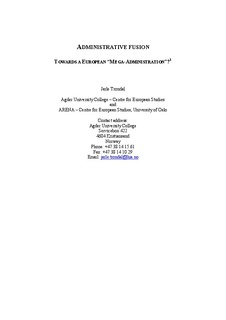| dc.contributor.author | Trondal, Jarle | |
| dc.date.accessioned | 2012-05-23T07:11:37Z | |
| dc.date.available | 2012-05-23T07:11:37Z | |
| dc.date.issued | 2007 | |
| dc.identifier.issn | 1503-4356 | |
| dc.identifier.uri | http://hdl.handle.net/11250/134897 | |
| dc.description.abstract | This study offers an organisation theory approach on administrative fusion. It is argued that the differentiated organisatational constellation of the European Union contributes to a differentiated fusion of domestic core executive institutions. It is argued that the European Commission mainly activates the lower echelons of the domestic government
hierarchies, notably professional experts within sector ministries and agencies. Furthermore, the European Commission arguably weakens domestic politico administrative leadership, the Foreign Office and the Prime Ministers Office. Based on a rich body of survey data this analysis reveals that multi-level interaction of administrative systems between the European Commission and the Norwegian central administration occur largely outside the control of the domestic politico-administrative leadership, Prime Ministers Office and Foreign Office. This tendency is to some extent counterbalanced by the interlocking effect of national systems of
co-ordination and politico-administrative control. | no_NO |
| dc.language.iso | eng | no_NO |
| dc.publisher | Centre for European Studies, Agder University College | no_NO |
| dc.relation.ispartofseries | CES Working Papers;2007:2; | |
| dc.title | Administrative fusion : towards a European "mega-administration"? | no_NO |
| dc.type | Working paper | no_NO |
| dc.subject.nsi | VDP::Social science: 200::Political science and organizational theory: 240 | no_NO |
| dc.source.pagenumber | 36 p | no_NO |
